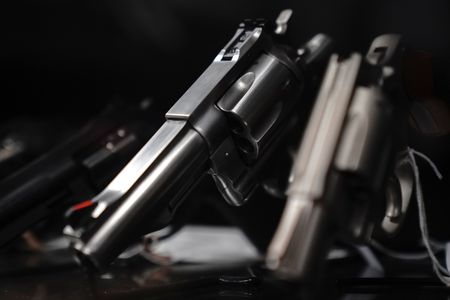By Brendan Pierson
(Reuters) – California and Hawaii can enforce bans on carrying guns in some public locations including bars and parks, a federal appeals court ruled on Friday, partly reversing lower court orders blocking the bans.
A unanimous panel of the San Francisco-based 9th U.S. Circuit Court of Appeals ruled that both states can enforce gun bans in bars and restaurants that serve alcohol and in parks, and that California can enforce bans in casinos, libraries, zoos, stadiums and museums. Those bans extend to adjacent parking lots.
The panel said Hawaii can ban guns on beaches, and on private property that is open to the public without explicit permission from the owner.
Both states passed their laws in response to a June 2022 ruling by the U.S. Supreme Court, which found for the first time that the right to bear arms guaranteed by the Second Amendment of the U.S. Constitution includes individuals’ right to carry handguns in public for self-defense.
The Supreme Court said any restrictions on carrying guns must be “consistent with this nation’s historical tradition of firearm regulation,” and could include bans in “sensitive places.” The states argued that their new restrictions qualified.
The lower courts in both states’ cases largely struck down the state laws after finding that there were no similar laws at the time the Second Amendment was adopted.
The 9th Circuit panel said that their reasoning was too narrow. For example, it found that parks in their modern form arose only in the 19th century and that municipalities quickly began banning firearms in them.
However, the appeals court upheld portions of lower court orders ruling that neither state could enforce bans on carrying guns in banks or adjacent parking lots, and that Hawaii cannot enforce a ban on guns in parking lots shared by government and non-government buildings. It said that California cannot enforce bans in hospitals, public transit, gatherings requiring a permit and places of worship.
All three judges on the panel were appointed by Democratic presidents.
“This law was never about safety,” Chuck Michel, president of California Rifle & Pistol Association, which had challenged the California bans, said in an email. “The places where permits are now invalid have now become criminal empowerment zones, and the public is less safe in those places.”
Michel said the plaintiffs would consider a petition for rehearing in the 9th Circuit or an appeal to the Supreme Court.
“I certainly am happy that they ruled for us on the issue of banks and shared parking lots,” said Alan Beck, a lawyer for the Hawaii plaintiffs, adding that the issue of a ban on private property could go to the Supreme Court.
The office of California Attorney General Rob Bonta and Hawaii Attorney General Anne Lopez did not immediately respond to request for comment.
(Reporting By Brendan Pierson in New York, Editing by Alexia Garamfalvi and Alistair Bell)











